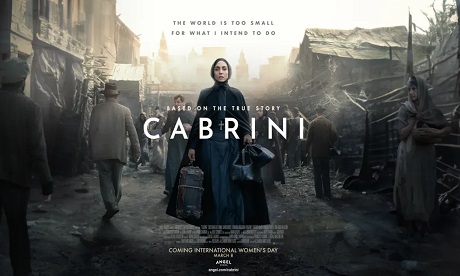“They oughta send them all back.”
“A wave of brown-skinned filth.”
“Keep your crime and your filth out of this neighbourhood.”
This is some of the invective directed at Mother Frances Xavier Cabrini after she arrives in a chaotic New York City, as depicted in the luminous new film drama Cabrini.
It should be obvious that the kind of abuse that bigots hurled at this future saint and her fellow Italian immigrants in 1889 is also freely applied to migrants today.
“Filthy dagoes, they just keep coming,” one gent tells the just-off-the-boat sister. “Who you looking at, guinea-pig?”
It’s a good historical rendering of Cabrini’s jarring welcome to New York; the scenes echo correspondence in which she wrote home requesting additional habits and veils for her sisters, “otherwise they will call us ‘guinea-pigs’ the way they do to the Italians here.”
(“Guinea” was a slur used against Black people, the coin used to purchase slaves.)
Patron saint of immigrants
The time is right for a new biopic of Mother Cabrini, the patron saint of immigrants and the first American citizen to be canonised.
From Donald Trump on down, many politicians are pushing antipathy for migrants to boost their election campaigns.
I see the result in my own Brooklyn neighbourhood, where efforts to help migrants at a local shelter are treated on social media with expressions of anger and sarcasm.
As Pope Francis has said, Cabrini’s life is of “extraordinary current relevance because migrants certainly need good laws, development programmes, and organisation.
But, “they also always need, first and foremost, love, friendship, and human closeness; they need to be heard, to have people look into their eyes, to be accompanied; they need God.”
Compassion still needed
The new film, produced by Angel Studios and directed by Alejandro Monteverde, finds this space and presents a much-needed message of compassion with great visual and emotional impact.
It’s a traditional underdog story, with a physically frail, five-foot-tall sister in the Rocky role fighting against the system.
The Italian actress Cristiana Dell’Anna, who starred in the HBO Max crime drama Gomorrah, brings a fiery determination to her portrayal of Cabrini.
I had some doubts about whether this team would do justice to the story.
That’s because Utah-based Angel Studios heavily markets its films and fundraising pitches to a conservative Christian audience.
I wondered if Cabrini would really present the saint’s pro-immigrant fervour at a time when conservative politicians are exploiting anti-immigrant sentiment.
That’s not to stereotype Evangelicals; many Christian groups have aided migrants, as Scripture demands, and some think a more Bible-based response is beginning to take hold.
But overall, for example, this isn’t so.
Not political
Nearly three-quarters of the white Evangelical Protestants interviewed in a PRRI survey would “favour installing deterrents to prevent immigrants from entering the country illegally even if they endanger or kill some people.”
Director Monteverde’s previous film for Angel Studios, last year’s box-office hit Sound of Freedom, has been lauded for spotlighting the evils and prevalence of child sex-trafficking.
But it was criticised because “the film could be seen as adjacent to the alt-right paranoia that was originally stoked by 4Chan and QAnon” on this subject, as Variety put it.
Monteverde and the film’s screenwriter responded in the Hollywood Reporter that the script was written in 2015, well before these conspiracy theories were spread, and that it “was not in the least political.”
But promotion for Sound of Freedom, aided by a special showing for Trump at his estate in Bedminster, N.J., was politicised.
That was highlighted when lead actor Jim Caviezel, best known for playing Jesus in Mel Gibson’s The Passion of the Christ, announced on Fox & Friends that voting for Trump was the way to take action against the trafficking of children for sex.
“This is the new Moses,” he said of Trump as he was interviewed along with the movie’s producer, the Mexican actor and political activist Eduardo Verástegui, who has similarly marketed his movies with a political slant.
Don’t expect Trump to embrace and promote Cabrini in the way he did Sound of Freedom. It contradicts his anti-immigrant agenda.
In the opening scene, for example, employees at a hospital turn away a young boy trying desperately to get care for his sick mother, remarking that Italian immigrants were “monkeys” and “inferior.”
It shows in shorthand the influence of the racist eugenic theory that was popular at the time, and which Trump is trying to revive by claiming that immigrants are “poisoning the blood of our country.”
When I spoke with the director, the executive producer, and the screenwriter in separate interviews, all said that Cabrini was not political: it’s not about immigration policy, but about immigrants.
That’s true. Read more
- Paul Moses is an author and a contributing writer to Commonweal.
News category: Analysis and Comment.




